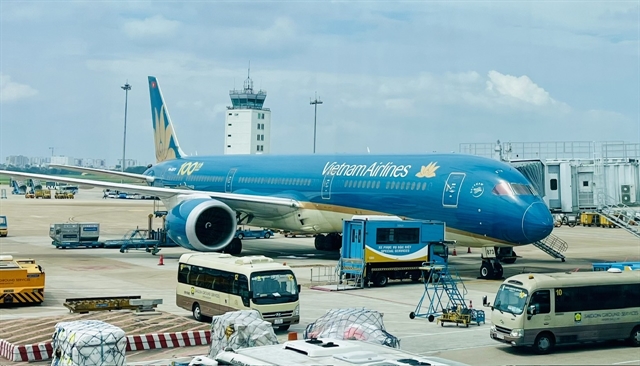
|
| A Vietnam Airlines aircraft parked at Tân Sơn Nhất International Airport in HCM City. — VNS Photo Bồ Xuân Hiệp |
HCM CITY — The Ministry of Transport is taking steps to stabilise currently high domestic airfares.
The ministry has announced plans to conduct a thorough review of the fees and operational costs incurred by airlines and ground service providers.
The Civil Aviation Authority of Việt Nam (CAAV) under the ministry has confirmed that the recent increase in domestic airfare is in accordance with regulations established by the relevant authorities.
The ministry has attributed this rise in fares to several factors, including increased fuel prices, fluctuations in exchange rates, engine recalls, costs associated with aircraft leasing, and heightened demand.
Furthermore, it has issued a warning that sustained high demand could lead to additional price increases during peak seasons.
Proposed strategies to mitigate fare increases include the optimisation of aircraft schedules and the enhancement of operational efficiency.
The ministry has mandated strict compliance with regulations pertaining to domestic passenger air transport pricing and fare declarations.
The ministry said it will strengthen oversight of fare declarations and promote early ticket purchases to facilitate more favourable pricing.
Vietnamese airlines are encouraged to expand their transport capacity and service offerings across both international and domestic routes.
They are urged to collaborate with global aircraft leasing partners to bolster fleet capacity, which may involve replacing grounded aircraft and exploring options to increase seat capacity on frequently travelled domestic routes.
Airlines are also encouraged to adopt flexible pricing strategies and maintain policies that allow for discounted fares.
Currently, local airlines operate around 160 aircraft, which is 60 to 70 units below pre-pandemic levels.
Experts said that a diverse and high-performance fleet is crucial for airlines to mitigate the impact of aircraft shortages and enhance operational efficiency.
They proposed investments in supply chain hubs be increased and negotiations with major manufacturers such as Boeing and Airbus be pursued to ensure timely delivery of aircraft.
Analyses of flight cost components showed that fuel expenses account for 37-42 per cent, maintenance constitutes 32-41 per cent, and ground services represent 6-7 per cent, with remaining costs making up 16-19 per cent. — VNS
- Reduce Hair Loss with PURA D’OR Gold Label Shampoo
- Castor Oil Has Made a “Huge” Difference With Hair and Brow Growth
- Excessive hair loss in men: Signs of illness that cannot be subjective
- Dịch Vụ SEO Website ở Los Angeles, CA: đưa trang web doanh nghiệp bạn lên top Google
- Nails Salon Sierra Madre
 VnExpress News The News Gateway of Vietnam
VnExpress News The News Gateway of Vietnam





